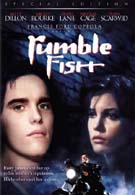Francis Ford Coppola has served as producer on a lot of great films but his directorial successes can be summed up in two words: Godfather trilogy. Sure, Apocolypse Now was acclaimed by all (I never saw what was so great – I’m going to pay for saying that, I know), but bear in mind this is the director who also brought us Michael Jackson’s Captain EO. If you don’t remember that one, count your blessings. Rumble Fish is one of his lesser works, and in general it’s better left on the rental shelf. It’s a sparkling but failed experiment in filmmaking that could be equated to drinking very pricey champagne that has lost all its fizz. Rusty James is a rough and tumble kid who has grown up in the shadow of his older brother, Motorcycle Boy. I guess we’re expected to understand why he’s called that; apparently he’s too legendary to have a real name. Known for his mental instability and tough guy persona, the Motorcycle Boy created his own backstreet mythology before he disappeared. Rusty James spends his days trying to fill the giant boots his brother left behind, most of the time failing miserably. When Motorcycle Boy makes a mysterious return to town, Rusty James tries harder than ever to live up to the image his brother is trying desperately to shake. Miserable failure compounds furiously as the two boys collide with the lofty but unreachable goals of who they hope to become.
In 1983 director Francis Ford Coppola tried in vain to create a movie with an art house feel that would appeal to a non-art house audience. However like his characters Rusty James and Motorcycle Boy, he failed. He makes an intriguing go of it, though, and the resulting film is full of choices that are unsuccessful, but occasionally interesting to watch.
Coppola pays homage to the classic film styles of yesteryear by setting the movie in black and white, giving him plenty of opportunities to acknowledge styles of classic directors like Alfred Hitchcock and William Wyler. There are scenes where it’s fun to see a movie made in the eighties with fifties cinematography, but in general it feels too self-serving and almost patronizing, like art-house stylizing for its own sake, not for the sake of the story.
The actors also play to a heightened style but I found myself too busy caught up in what they looked like back in the eighties to pay much attention to their performance. Mickey Rourke, who plays Motorcycle Boy, is almost unrecognizable as an enigmatically handsome younger man with a smooth face that hasn’t yet borne the burden of a brutal boxing career. Diane Lane and Matt Dillon, both in their late teens at the time, strike an amazing chemistry for two such young actors. As Rusty James and his girlfriend, Patty, they prove early on why they would go on to such successful careers.
One thing to be said for Coppola, he’s a good experimentater. Yes, that is a word, and it’s only fitting to use such a peculiar term to describe the mind behind such a peculiar film. In a lot of ways his visual work in Rumble Fish reminds me of the Wachowskis’ Matrix movies: it would appear to be trying to make some kind of sense, but most of the time it’s nothing more than pseudo-creative rambling. At every turn of the story Coppola finds an odd or different way to express visually what the characters are going through emotionally. Occasionally the experimentation pays off, resulting in some poignant cinematic moments. More often than not, though, the scenes just became extravagant indulgences on the director’s part and I was left trying to sort out the experimental antics from the significant visual imagery.
Basically, Coppola has created the ultimate pretentious film-school case study. Regardless of whether or not they work, he uses every shadow/light and camera angle trick in the book. There is no visual device he isn’t willing to try to make a scene as artsy and stylized as possible. To boot, he gets the kind of affected performances out of his actors that every wannabe-edgy director drools over. On top of it all he gets credit for discovering his nephew, Nicholas Cage. Sure this kind of movie is great stuff for filmmaker class but it’s a bit too much creative playing around for your average audience. The saving graces for the Rumble Fish DVD experience are the bonus extras. They give the very quirky film a much needed creative context and form an almost complete package to understanding and exploring the film.
The two featurettes, On Location in Tulsa: The Making of Rumble Fish and The Percussion Based Score explore two of the more fascinating aspects of the movie: its conception and its sound track. Coppola envisioned the film’s many intricate angles and lighting effects through a series of blue screen stage tests. Essentially filming the entire movie twice, he was able to perfect the visuals long before they were actually shot. The sound track, written by Stewart Copeland (yes, drummer for the Police) is unique and the story behind its creation is equally enjoyable.
Coppola gives a very heart-felt and honest commentary in which he makes a lot of confessions that I wouldn’t have expected. Among them is the fact that the film wasn’t a success, something he seems comfortable with. He also acknowledges that a lot of the odd choices he made stemmed from very simple, if not silly, ideas. For example, the movie’s lack of color was a choice based on that face that one of the characters is color blind. He never misses a chance to dote on daughter Sofia Coppola, who has a small role in the film. Listening to him talk only confirms my sentiment that this movie belongs on the shelves of film schools, not movie stores.
The deleted scenes are no more or less interesting to watch than the rest of the film. They’re the same kind of artsy storytelling full of awkward moments and unusual camera angles. Unfortunately Coppola doesn’t take the time to share his feelings about them or give the reasons why they didn’t make the final cut. They would be infinitely more enjoyable to watch if he had done us that small honor.
The original trailer and a music video (“Don’t Box Me In”) round out the bonus features. The only thing missing is commentary or discussion from the likes of Rourke, Dillon, Cage or Lane. Their thoughts and remembrances would have been a nice touch to an already well-presented package. Despite all the bright points provided by the special extras, there’s still no reason to bother with the movie unless you’re a die-hard Coppola fan or really like artsy movies. Other wise, leave the Rumble Fish to sleep with rest of the fishes, a fate worthy of a movie from the maker of The Godfather.
I Thought Elsbeth's Bloody Judge Crawford Twist Had To Be A Fake Out, But Now I Have Questions For The Season 2 Finale
A24’s The Legend Of Ochi Hired A YouTuber Making Bird Sounds In His Basement To Work On The Movie, And I'm Wowed By The Whole Process
Charli XCX Is Not Going To Be In Greta Gerwig's Narnia Movie After All, But I'm Psyched That We're Still Getting A Barbie Reunion Thanks To New Casting











